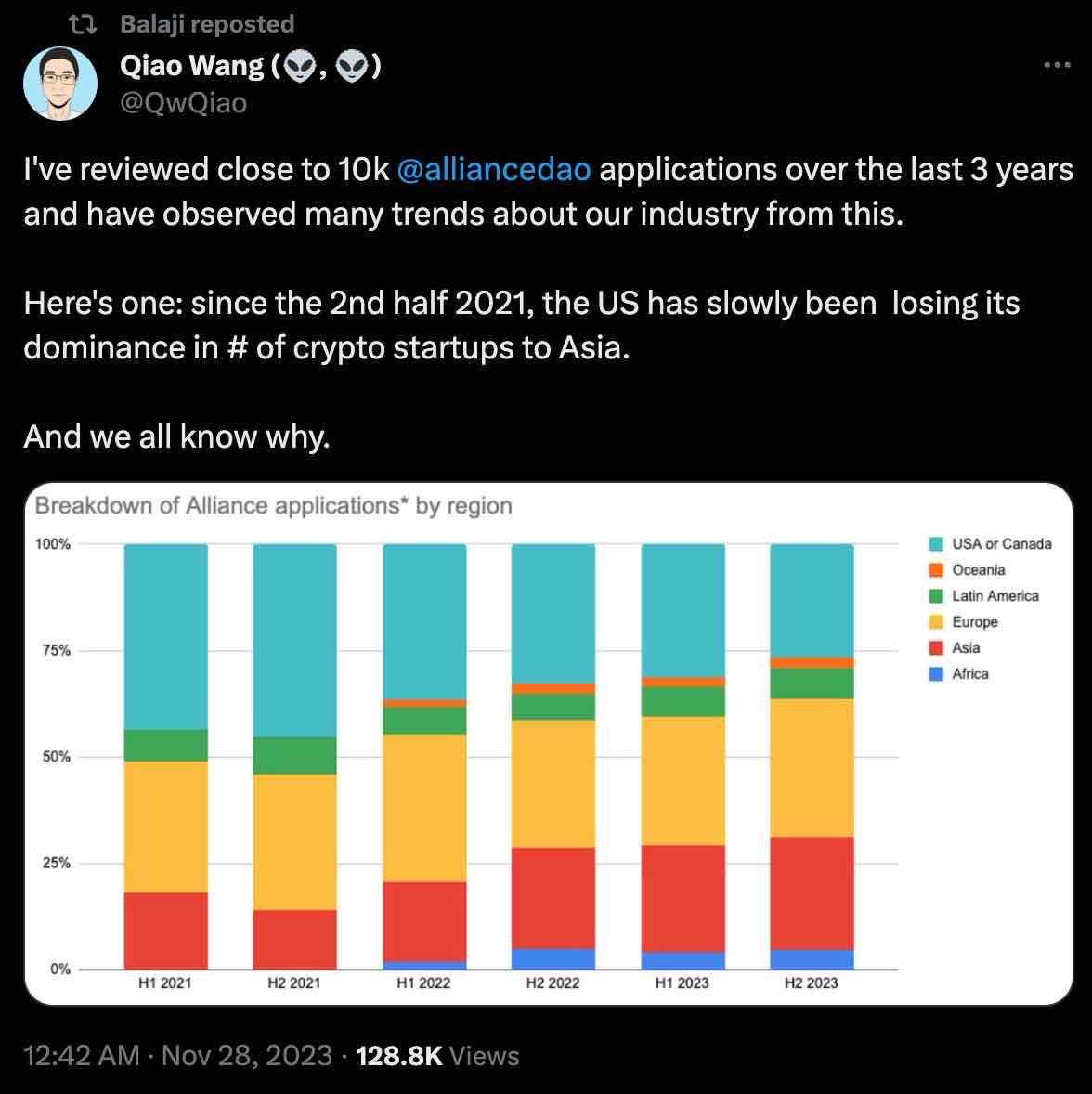撰文:深潮 TechFlow
Balaji 是一位美国的企业家、投资人,也是极富创造力的哲学家与思想家,他曾是 Earn.com(后被 Coinbase 收购)、Counsyl 的联合创始人,Coinbase 的前 CTO,以及 a16z 的合伙人,也是《网络国家》一书的作者。
昨日,他参与了社区的 AMA ,深入且广泛的聊到了多个有关政治、经济和科技的话题。深潮精选了其中的一些回答,包括关于网络国家、去中心化的进程、长寿/永生以及当今生物科学等有趣问题。
此外,提问者中也不乏重量级人物,比如下面的 6 个问题便是由 Vitalik 提出:
-
似乎自 2021 年以来,“寻找替代旧金山”的势头有所减弱,其中人工智能和“回归办公室”的要求导致了中心化的回归。在当前情境下,你对如何打破这种网络效应,创造更实际的地理自由有何新的看法?
Balaji:我认为我们仍然在朝着至少三个技术极点(我称之为 NYT、CCP、BTC)以及一个将它们巧妙结合的去中心化中心的方向前进。
为什么呢?因为:(a)加密货币已经在全球范围内实现了去中心化,而且这一趋势自 2021 年以来一直在加速,同时 (b)人工智能的执行指令鼓励去中心化(因为大家可能会从不同的角度问问题)。

(c)我认为在美国法规/经济方面还有更多变数。例如:在旧金山/加利福尼亚禁止自动驾驶汽车的例子表明他们将阻拦更多的新技术采用。我们将看到在这座最科技化城市中,一小群科技人员是否能够通过人工智能颠覆许多蓝领工作而赚取数十亿美元...
基本上,我的观点是:旧金山虽然重要但不是绝对必需。是的,我们可以通过“Gray Tribe”策略收复城市。但同样可能被更强大的蓝色(科技)政治力量吞噬,这些力量反对人工智能的颠覆。 (Gray = "去中心化的中心")
-
您见过的“区块链作为记录账本”的最佳实例是什么?
Balaji:我认为 wijuwiju.eth 的 interface.social 在以太坊区块链上拥有出色的类似 Twitter 风格的界面。这正是我们想要的——一个非常熟悉的用户界面,显示可加密证明的事件。
-
您在哪些问题上最不同意“印度中产阶级精英”的观点?或您在哪些问题上最不同意“硅谷中产科技风险投资者”的观点?
Balaji:“印度中产阶级精英”尚未意识到科技从业者在印度的生活水平已经逐渐优于西方了。这就是为什么关于班加罗尔与旧金山的看似无关痛痒的讨论,在 Twitter 上会传播甚广的原因。参考这篇推文。
一个更有趣的答案可能涉及到印度侨民的角色。侨民是印度民族、印度网络,但不包括印度国家。我我对此的想法不同,但我认为开始他们获得接受,参考这篇文章。
-
网络国家能为东道国提供的最大增值是什么(或应该尝试提供的)?
Balaji:明显的增值是经济。为当地人提供比他们拥有的更多的资本。我认为这是必要的。但还不够。你还希望许多当地人成为“双重公民”,比如比特币美国人或以太坊日本人。
-
你认为网络国家至少在短期内应寻求东道国政府提供的最合理和现实的自治/法律让步是什么?
Balaji:过上自己想要的生活方式所需的最低限度的自主权。通过在群体内达成共识的社会约定,你可以做很多事情。
-
你没有预想到哪些类型的人会对网络国家想法感兴趣?
Balaji:令我惊讶的是,即使没有翻译,世界上许多不同地区的人们也能如此迅速地理解这个概念。两个例子:
1.加泰罗尼亚人
2.日本人
还有一些我完全没有预料到会吸引的人,他们并不优先考虑与我相同的事物,但确实想要共同建设社区。例如:在渴望改变世界现状的人中,网络国家的支持者更多地来自进步左派而不是中左派。
而下面的问题,则源自于 Balaji AMA 中其他的问答整理。
-
“家”对你来说意味着什么?哪些城市、地方等最让你感到像家一样,为什么?
Balaji:“家”就是手机主屏幕。
开玩笑了,认真地说我喜欢一个稳定的物理环境,但我并不特别在意它在哪里。我只是想要一个可以喝咖啡、在阳光下散步、安静思考的地方。不一定要很豪华。
-
是否应该将网络国家形成为 DAO(去中心化自治组织)?如果是的话,应该使用哪个平台(例如以太坊、比特币或其他)?
Balaji:从技术角度看,平台并不重要,社区才是至关重要的。你是否能够吸引到 10 位付费会员并保持他们的经常性参与,这听起来既容易又困难。
-
你读过 Vitalik的新帖子“d/acc”吗?(tldr,他对技术乐观主义的看法 )如果读过的话,它与 Gray / Network State 运动相容性如何?
Balaji:这是一篇不错的帖子。我可能会很快写一些带有更多进化/生物学角度的东西,因为我认为这可能是我们思考硅基智能进化的最好先例。
-
您对网络国家治理可能比更传统的现有治理更容易受到社交媒体影响的评论有何看法?
Balaji:我的回答是,请想一想特朗普 。
更广泛地说,所有治理都受社交媒体的左右。就像传统金融正在变得和去中心化金融一样不稳定。
唯一的解决办法就是迎难而上。我们需要建立首要面向互联网的机构,能够应对互联网的不稳定性。
-
你遇到过反对比特币的最有力论点是什么(即你认为有道理的)?
Balaji:苹果、谷歌和微软对整个加密货币体系(包括比特币在内)构成系统性风险,因为它们可以通过软件更新植入后门私钥。可以看看这个推文。
-
您预计第一个类似网络国家的国家出现会在什么时候?
Balaji:从白皮书到萨尔瓦多承认比特币,花了 13 年的时间。所以我们拭目以待…
-
您如何看待对于拥有分布式物业的在线组织?
Balaji:在可预见的未来,它将“只是”一家跨国公司。有许多已知的拥有全球房地产的实体,从希尔顿和星巴克到建筑和科技公司。这取决于你想做什么。
-
网络国家是否可组合?是否会出现网络国家的网络(城市、国家、联盟)?
Balaji:是的,网络国家是可以组合的。我在书中有所阐述。简而言之,可以将其想象为星巴克收购 Peet's 咖啡部分或全部门店,并更改品牌使您的星巴克卡可用。这就是两个网络部分或完全进行并购的情况。
-
您对波兰的看法是什么?
Balaji:东欧可能成为新的西欧。如果美国离开乌克兰让其自行决定,波兰将需要解决与俄罗斯的关系问题。除此之外,波兰的定位有很多值得喜欢的地方。
-
当今,生物医学领域哪些有趣的进展让您最兴奋?
Balaji:我最期待的是研究如何长寿的领域。请参考:
-
有哪些东西(行业、理念、互联网亚文化)现在的地位较低,而您认为 5 到 8 年后会得到很高的地位?
Balaji:Bro science(健身与饮食相关)。它将成为自我实验的基础,让我们走向长寿和人类 2.0。
-
很多讨论集中在创建越来越小的部落上,相对较少涉及增加全球合作。如何在文明形成需要更大纽带和叙事,但创新主要发生在小团体中且迭代速度快之间寻找平衡?
Balaji:我认为我们看到了一个中央集权的东方和一个去中心化的西方。在东方,大规模实体仍然存在,而在西方,小规模实体不断增加,并且在以前由西方稳定的地区也是如此。
-
您的早年生活是什么样的,5-16 岁之间?以及您认为什么对塑造今天的您贡献最大?
Balaji:K-12(学前至高中)对我来说就像是监狱。但最终让我获得物理知识和自学能力,那时互联网还没有真正普及。
怎么描述我比较贴切? 我真不是个搞计算机的人,但我一直是崇尚数学的人。
-
当政府开始注意到人们更倾向于与他们的网络国家而非实体国家对齐时,是否为某种冲突打下了基础?如果是这样网络国家应该如何应对?是否应成为一个政党?
Balaji:是的,这可能为一种冲突打下基础。当人们更加认同网络国家而非实体国家时,可能引发对权力和控制的争夺。
我认为政治运动是网络社区和网络国家之间的中间阶段。是否在特定国家成为一个政党尚待确定,但这确实是一个选择。
-
根据您目前了解的信息,人类距离实现“永生”还有多远?
Balaji:比我们想象的要近得多。在老鼠之类的动物中已经取得了令人印象深刻的成果。
-
下一个短期目标是什么?
Balaji:完成《网络国家》一书的最终版本——包括平装版、精装版、有声读物、翻译以及开源代码库。
免责声明:本文章仅代表作者个人观点,不代表本平台的立场和观点。本文章仅供信息分享,不构成对任何人的任何投资建议。用户与作者之间的任何争议,与本平台无关。如网页中刊载的文章或图片涉及侵权,请提供相关的权利证明和身份证明发送邮件到support@aicoin.com,本平台相关工作人员将会进行核查。




